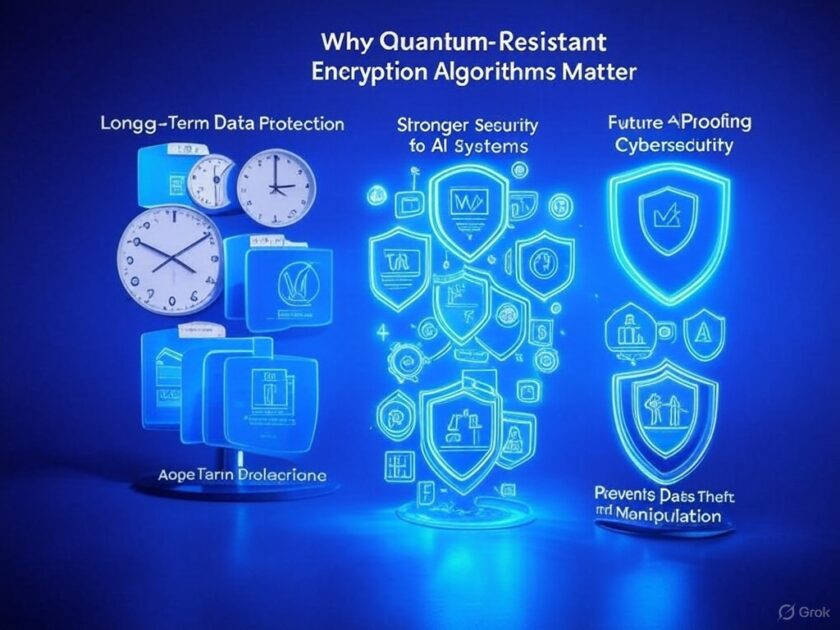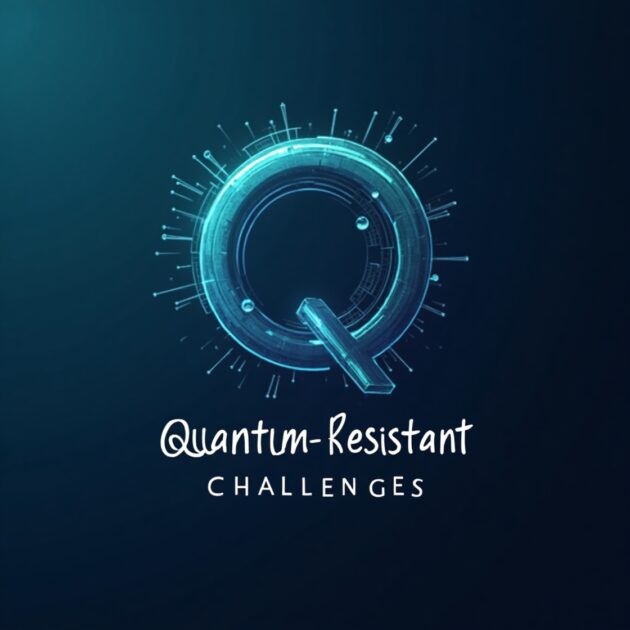Securing AI Data with Quantum-Resistant Tech

The world is becoming more digital every day. AI is now part of businesses, healthcare, banking, and even personal devices. It processes large amounts of data to make life easier and more efficient. However, this data is valuable, and cybercriminals are always looking for ways to steal or misuse it.

Right now, most data is protected by encryption. Encryption scrambles information so only authorized people can read it. But with the rise of quantum computers, traditional encryption is at risk. Quantum computers are powerful enough to break current security systems in minutes. This means sensitive data could be exposed, leading to fraud, identity theft, and business losses.
To stay safe, we need stronger protection. Quantum-resistant encryption algorithms are the future of cybersecurity. These advanced methods are designed to withstand quantum attacks and keep AI data secure for years to come. In this article, we will explore what quantum-resistant encryption is, why it matters, and how you can prepare for the future.
Why AI Data Needs Stronger Security
AI processes vast amounts of data every second. This data includes personal details, business strategies, government records, and medical histories. If this information falls into the wrong hands, the consequences can be severe. Hackers use advanced techniques to break into systems, steal sensitive data, and sell it for illegal purposes.

Growing Cyber Threats
Cyber attacks are becoming more common and more dangerous. AI systems are a prime target because they hold valuable data. Hackers use malware, phishing attacks, and other methods to steal information. With quantum computing, these attacks could become even more powerful. Standard encryption may no longer be enough to keep AI data safe.
The Risks of Data Breaches
When AI data is stolen, it can cause serious problems. Businesses can lose money, customers can lose trust, and governments can face security threats. A data breach can also lead to legal issues, as many countries have strict data protection laws. Companies that fail to protect data may face heavy fines and lawsuits.
AI-Powered Cybercrime
Hackers are now using AI to launch smarter attacks. AI can help criminals find weak spots in security systems faster than ever before. This makes traditional security methods outdated. Without stronger encryption, AI-driven cybercrime will continue to grow.
Protecting AI Innovations
AI is helping businesses grow, improving healthcare, and making everyday life more convenient. But if AI data is not secure, progress could slow down. Companies may be afraid to invest in AI if they think their data could be stolen. Securing AI data ensures continued innovation and trust in AI technology.
The Need for Future-Proof Security
Technology is evolving fast, and security must evolve with it. Quantum-resistant encryption is designed to protect AI data now and in the future. Unlike traditional encryption, which may become useless against quantum computers, quantum-resistant encryption ensures long-term security. Organizations that adopt it today will be better prepared for tomorrow’s threats.
What Are Quantum-Resistant Encryption Algorithms?
Quantum-resistant encryption algorithms are security methods designed to withstand attacks from quantum computers. Traditional encryption methods, like RSA and ECC, rely on complex mathematical problems that classical computers take years to solve. However, quantum computers can break these codes in minutes, making current security systems outdated.
To solve this issue, researchers have developed encryption techniques that even quantum computers cannot easily crack. These quantum-safe cryptography methods rely on complex mathematical structures that remain secure even under quantum attacks. Some of the most promising quantum-resistant encryption techniques include:
1. Lattice-Based Cryptography
Lattice-based cryptography uses multidimensional mathematical grids to create strong encryption. It is highly secure and resistant to quantum decryption techniques. One of the best-known lattice-based encryption methods is CRYSTALS-Kyber, which is being considered for global cybersecurity standards.
2. Hash-Based Cryptography
Hash-based cryptography relies on cryptographic hash functions to secure data. This method is especially effective for digital signatures and is already being used in some security protocols. SPHINCS+ is a well-known hash-based encryption algorithm with strong quantum resistance.
3. Code-Based Cryptography
Code-based cryptography relies on complex error-correcting codes. One of the most studied algorithms in this category is McEliece, which has been around since the 1970s and remains unbroken by quantum computing.
4. Multivariate Polynomial Cryptography
This encryption method uses complex mathematical equations with multiple variables to secure data. It is one of the lesser-known but promising areas in quantum-safe encryption.
5. Symmetric Key Cryptography
While asymmetric encryption (like RSA) is at risk, symmetric key encryption methods, such as AES-256, are considered quantum-resistant when the key size is large enough. Many cybersecurity experts recommend upgrading encryption systems to use larger key sizes for additional protection.
Why Quantum-Resistant Encryption Algorithms Matter

-
- Long-Term Data Protection: This ensures that data remains secure even as quantum technology advances.
-
- Stronger Security for AI Systems: Protects AI-driven businesses, financial transactions, and personal data.
-
- Future-Proofing Cybersecurity: Prevents security breaches before quantum computers become widely available.
-
- Regulatory Compliance: Governments and organizations are starting to require quantum-resistant security for sensitive data.
-
- Prevents Data Theft and Manipulation: Cybercriminals won’t be able to decrypt stored data even years after it is collected.
Benefits of Quantum-Resistant Encryption Algorithms
In today’s digital world, AI and other technologies rely heavily on data. As cyber threats grow, quantum-resistant encryption algorithms provide an essential layer of protection. Let’s explore more benefits of using these algorithms in a way that is easy to understand.

-
- Protection from Future Quantum Threats
Quantum computers can break traditional encryption methods in the future. Quantum-resistant encryption algorithms are designed to stop these powerful machines. By using these algorithms today, you can make sure that your data stays safe even when quantum computers become more common.
- Protection from Future Quantum Threats
-
- Enhanced Data Security
One of the primary reasons for using quantum-resistant encryption is to boost security. These algorithms provide a stronger defense against cyberattacks. With AI systems handling more sensitive data, stronger encryption ensures that important information is well-guarded and cannot be accessed without authorization.
- Enhanced Data Security
-
- Increased Data Privacy
Privacy is crucial, especially when dealing with personal or private data. Quantum-resistant encryption ensures that data is not easily intercepted or decoded. It keeps your sensitive information safe from hackers and unauthorized access, which is particularly important in sectors like healthcare and finance.
- Increased Data Privacy
-
- Keeps Your Information Safe Over Time
Unlike some encryption methods that might become weak over time, quantum-resistant encryption offers long-term protection. As technology evolves, your data remains secure against new threats. This is important for industries that need to store data for many years, like government organizations or research labs.
- Keeps Your Information Safe Over Time
-
- Improved Trust in Digital Systems
Businesses and customers need to trust that their data is safe. Quantum-resistant encryption helps build this trust by ensuring that data is protected against future threats. When people know their data is secure, they are more likely to adopt and use AI systems and digital tools, leading to the more widespread use of new technologies.
- Improved Trust in Digital Systems
-
- Supports Compliance with Data Protection Laws
With data protection laws like GDPR becoming stricter, quantum-resistant encryption helps companies meet these legal requirements. It ensures that customer and personal data is protected to the highest standards, helping businesses avoid potential penalties and fines.
- Supports Compliance with Data Protection Laws
-
- Reduces Risk of Data Breaches
Data breaches can cause serious damage to both companies and customers. By using quantum-resistant encryption, the risk of sensitive data being stolen or exposed is significantly lowered. This proactive approach helps reduce the chances of a costly data breach, saving both time and money in the long run.
- Reduces Risk of Data Breaches
-
- Scalable and Adaptable for Future Needs
Quantum-resistant encryption algorithms are flexible and can adapt to new technological changes. As businesses grow and generate more data, these algorithms can scale to meet the increasing security needs of the system. This scalability makes them ideal for long-term use in a rapidly changing digital world.
- Scalable and Adaptable for Future Needs
-
- Boosts Confidence in AI and Emerging Technologies
When it comes to AI, blockchain, and IoT, security is a top concern. Quantum-resistant encryption can make these technologies more secure, allowing companies to innovate confidently. Knowing that AI data is protected by advanced encryption encourages investment and faster adoption of cutting-edge technologies.
- Boosts Confidence in AI and Emerging Technologies
Challenges in Implementing Quantum-Resistant Tech
Implementing quantum-resistant technology presents several challenges. While these advanced encryption methods offer strong protection against future threats, there are obstacles to adopting them on a large scale. Let’s take a closer look at some of these challenges.

One of the biggest issues is the complexity of quantum-resistant algorithms. These algorithms are often more intricate and require more computing power than traditional encryption methods. For example, lattice-based algorithms might require larger key sizes to ensure strong security, making encryption and decryption processes slower. This added complexity can impact system performance, especially in environments where speed is crucial, such as real-time applications.
Another challenge is compatibility. Many systems and devices today rely on traditional encryption methods, and switching to quantum-resistant algorithms requires significant updates to hardware and software. Businesses may face difficulties in making their existing systems compatible with these new encryption methods, especially if they are using outdated infrastructure. This means that the transition could require substantial investment in new technology and the retraining of employees to understand the updated security protocols.
The lack of standardization is also a key obstacle. Quantum-resistant algorithms are still in the development phase, and there is no universally accepted standard yet. This makes it difficult for companies to choose the right algorithms for their needs. The uncertainty over which encryption methods will become the industry standard adds to the complexity of implementation, as organizations need to balance future-proofing with current needs.
Cost is another significant factor. Developing and deploying quantum-resistant encryption solutions can be expensive. Businesses must invest in new hardware, software, and the training required to integrate these advanced systems. Additionally, quantum-resistant algorithms often require more computational resources, which can drive up costs for maintaining these systems in the long run.
Scalability is an important consideration as well. While quantum-resistant encryption works well for securing smaller datasets or isolated systems, it may face challenges when applied to large-scale systems. Handling massive amounts of data with quantum-resistant algorithms might demand significant resources, such as faster processors and more storage space, to ensure efficiency. As the demand for encryption increases, these scalability issues could become more pronounced.
Finally, there’s the challenge of ensuring long-term security. Although quantum-resistant algorithms are designed to protect data from quantum computers, they must also be robust enough to withstand future developments in quantum computing. As quantum technology evolves, there may be breakthroughs that could make existing quantum-resistant methods vulnerable. This means ongoing research and development will be needed to keep encryption techniques secure over time.
Despite these challenges, the need for quantum-resistant encryption remains critical. As quantum computing continues to evolve, organizations must work toward implementing these technologies to stay ahead of potential threats. Addressing these challenges requires collaboration across industries, research institutions, and governments to ensure that quantum-resistant encryption can be adopted effectively and efficiently.
Pros of Quantum-Resistant Encryption Algorithms
-
- Future-Proof Security
Quantum-resistant encryption is designed to protect data from the power of quantum computers. It ensures that your data remains secure, even as new technology emerges.
- Future-Proof Security
-
- Enhanced Privacy
These algorithms provide a higher level of privacy, protecting sensitive data from unauthorized access, even with powerful quantum computers.
- Enhanced Privacy
-
- Long-Term Protection
They are built to offer security over time, helping businesses and individuals keep data safe for many years.
- Long-Term Protection
-
- Improved Trust in Digital Systems
Using quantum-resistant encryption increases confidence in digital systems, which is essential for industries dealing with sensitive data like healthcare, finance, and government.
- Improved Trust in Digital Systems
-
- Compliance with Data Protection Laws
These encryption algorithms can help businesses comply with strict data protection laws, avoiding fines and penalties.
- Compliance with Data Protection Laws
Cons of Quantum-Resistant Encryption Algorithms
-
- Higher Complexity
Quantum-resistant algorithms can be more complex than traditional encryption methods, which might slow down data processing or increase the load on systems.
- Higher Complexity
-
- Compatibility Issues
Integrating these algorithms into existing systems can be challenging, especially for businesses with outdated infrastructure.
- Compatibility Issues
-
- Increased Cost
Implementing quantum-resistant encryption often requires new hardware, software, and staff training, which can be expensive.
- Increased Cost
-
- Lack of Standardization
Since quantum-resistant encryption is still developing, there is no clear standard yet. This can create uncertainty for businesses deciding which method to use.
- Lack of Standardization
- Scalability Challenges
Some quantum-resistant algorithms may struggle to handle large amounts of data, requiring more resources and higher costs to maintain.
Conclusion
Quantum-resistant encryption algorithms are important for protecting data against future risks, especially as quantum computers develop. While they come with some challenges, such as higher costs and complexity, they offer long-term benefits in keeping data secure. By adopting these advanced encryption methods now, we can ensure that sensitive information remains protected as technology advances. Even though it might be harder to implement at first, the security these algorithms provide is worth the effort.
Frequently Asked Questions (FAQ):
What are quantum-resistant encryption algorithms?
Answer : Quantum-resistant encryption algorithms are security methods designed to protect data from quantum computers. They use mathematical problems that are difficult for quantum computers to solve, ensuring that data stays secure even when future quantum technology becomes more powerful.
Why is quantum-resistant encryption important?
Answer : As quantum computers become more advanced, they could potentially break traditional encryption methods. Quantum-resistant encryption ensures that sensitive data remains secure even in the face of these powerful future threats.
How do quantum-resistant encryption algorithms work?
Answer : These algorithms work by using different types of mathematical problems, like lattice-based or code-based encryption, that are much harder for quantum computers to crack compared to traditional encryption methods. This makes them ideal for protecting data long-term.
Are quantum-resistant encryption algorithms ready to use?
Answer : Many quantum-resistant algorithms are still in the development phase and have not yet been widely adopted. However, they are being researched and tested to make sure they are ready for use in the future when quantum computing becomes more accessible.
Can quantum-resistant encryption replace current encryption methods?
Answer : Quantum-resistant encryption is still evolving, but it could eventually replace current encryption methods for protecting data in the future. For now, it is essential to start preparing and experimenting with these new algorithms to stay ahead of quantum threats.
Will quantum-resistant encryption affect my system’s performance?
Answer : Yes, quantum-resistant encryption algorithms may require more computational power, which can affect system performance. This could lead to slower encryption and decryption processes, especially for large datasets. However, the added security outweighs these performance concerns.
How much does implementing quantum-resistant encryption cost?
Answer : Implementing quantum-resistant encryption can be expensive. It may require new hardware, software updates, and staff training. However, the cost is an investment in long-term security, helping to protect data for years to come.
Are there any risks with quantum-resistant encryption?
Answer : One of the risks is the lack of standardization. Since quantum-resistant encryption is still developing, there may be uncertainty about which algorithms will become the industry standard. There could also be issues with scalability as businesses move to implement these new methods.
How soon should I start using quantum-resistant encryption?
Answer : It’s a good idea to start exploring quantum-resistant encryption now, even though full-scale adoption may not be necessary yet. Preparing your systems today can help you stay ahead of future threats posed by quantum computers.



